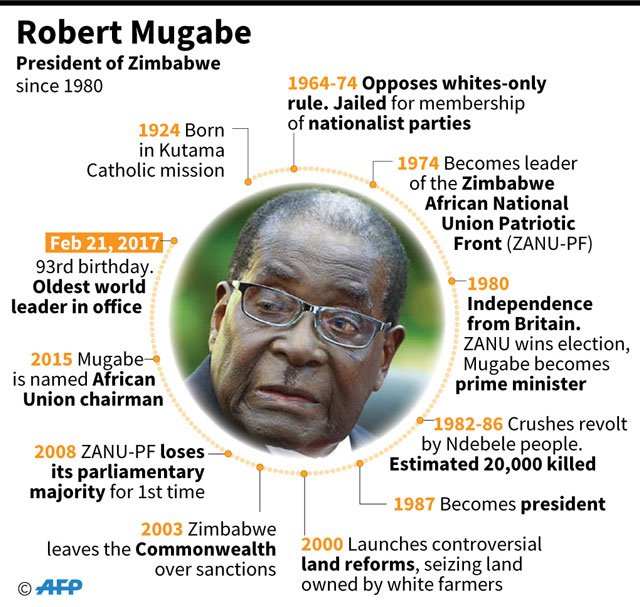
How Zimbabweans kicked out 93-year old veteran leader
Kampala, Uganda | IAN KATUSIIME | For most people, it was hard to keep up with events in Zimbabwe as the end of the 37-year reign of President Robert Gabriel Mugabe neared.
In one week, Mugabe was placed under house arrest by the Zimbabwean military, held negotiations with the army generals who detained him, presided over a university ceremony in a shrewdly managed affair by the military, and witnessed Zimbabweans marching the streets demanding his resignation. By the sixth day, Mugabe had already been removed as ruling party head, had snubbed demands that he resign, and been given an ultimatum before impeachment proceedings could begin.
The long lingering drama peaked when Mugabe, urged on by First Lady Grace Mugabe, sacked Vice president Emmerson Mnangagwa, a Zimbabwe African National Union-Patriotic Front (ZANU-PF) stalwart and influential figure. The sacking was understood to clear the way for Grace to succeed her husband and the Chief of Zimbabwe Defence Forces Gen Constantino Chiwenga, moved troops to block it.
But even at his weakest hour, with power slipping from him, 93-year-old Mugabe was as defiant as ever. In negotiations with Gen. Chiwenga, one of Africa’s few remaining liberation figures reportedly demanded that the army admit they were acting unconstitutionally. Then in a televised address to the nation on Nov 19, instead of announcing his resignation, Mugabe stated firmly that he was in charge and the generals appeared to defer to him as the commander-in-chief after the speech.
Mugabe the revolutionary
Over the years, Mugabe’s fiery rhetoric and hard stance on Western imperialism cemented his position among Africa’s revolutionaries. But he also turned into an intolerant leader, brutally crushing dissent, and often jailing critics and opponents.
With time, it became difficult to separate Mugabe’s trademark thick glass frames and his thin strip of moustache from the image of the southern African country and its tattered economy of mind-numbing inflation figures.
He was criticized for mishandling the economy, the unending corruption and most of all, his merciless crackdown on opposition to his rule.
Radical land reforms he implemented starting in the 2000s marked a turning point in Mugabe’s presidency. He was vilified by western media when he traversed Zimbabwe denouncing Western powers; particularly the United Kingdom, as forces intent on recolonising the southern African country by overthrowing him.
Mugabe argued that the remnants of colonialism could only be dismantled with sweeping changes in Zimbabwe’s land tenure system which he said left ordinary people at the mercy of the white minority that were dominating the economy. The move earned Mugabe admiration and condemnation in equal measure and the land seizures came to be a defining factor of his presidency and legacy.
Staying power of ZANU-PF
As the stunning events swept through Zimbabwe, ruling parties especially revolutionary parties are facing scrutiny over the power they wield. Although Mugabe did not form ZANU-PF, he has been its most feared and charismatic leader. Few anticipated a scenario where he would be ousted by a party he led and empowered with so much force. If it could happen to Mugabe, it could happen to anyone.
With the ouster of Mugabe and with Mnangagwa as interim party president and first secretary, ZANU-PF will hold an extra ordinary party congress in December to elect new leadership as it gears up for the 2018 presidential elections.
The congress is expected to calm infighting in the party, especially with Grace Mugabe out and facing prosecution. The Mnangagwa and Grace factions have clashed openly in the last few years as Mugabe’s ability to lead dwindled. Grace’s faction dubbed G40, mostly composed of youthful politicians was seen as getting favour from the president as the Lacoste group, allied to Mnangagwa was sidelined. Lacoste made up of elderly ZANU-PF politicians and war veterans was increasingly agitated by the first lady’s public behavior and her attempts to usurp power.
One Zimbabwean journalist described the events in Zimbabwe as “a re-alignment and not a revolution”. He wrote in an article in African Arguments that: “These ZANU-PF leaders likely calculate that Mnangagwa is strong, respected and feared enough to convince both the electorate and international community that he can be trusted to lead the country out of its current economic mess. It also serves the Party’s purpose that the ZANU-PF stalwart has no significant popular constituency and can therefore be more easily removed should he step out of line.”
Meanwhile, the party that led Zimbabwe to independence in 1980 has continued its purge of “criminal elements” as the army spokesperson announced on the state broadcaster on the night of the coup.
By the time of writing, about a dozen officials close to Mugabe had been expelled from the party including top ministers, MPs, the deputy director of the Central Intelligence Organisation and president of ZANU-PF National Youth League.
As ZANU-PF continues to reshape itself, it is being watched closely in neighboring South Africa, where the leaders of the African National Congress (ANC); the party that fought to end apartheid, have become discredited. After forcing Thabo Mbeki to resign the presidency with a no-confidence vote, his successor Jacob Zuma has fought several battles to retain control of the party.
 The Independent Uganda: You get the Truth we Pay the Price
The Independent Uganda: You get the Truth we Pay the Price





